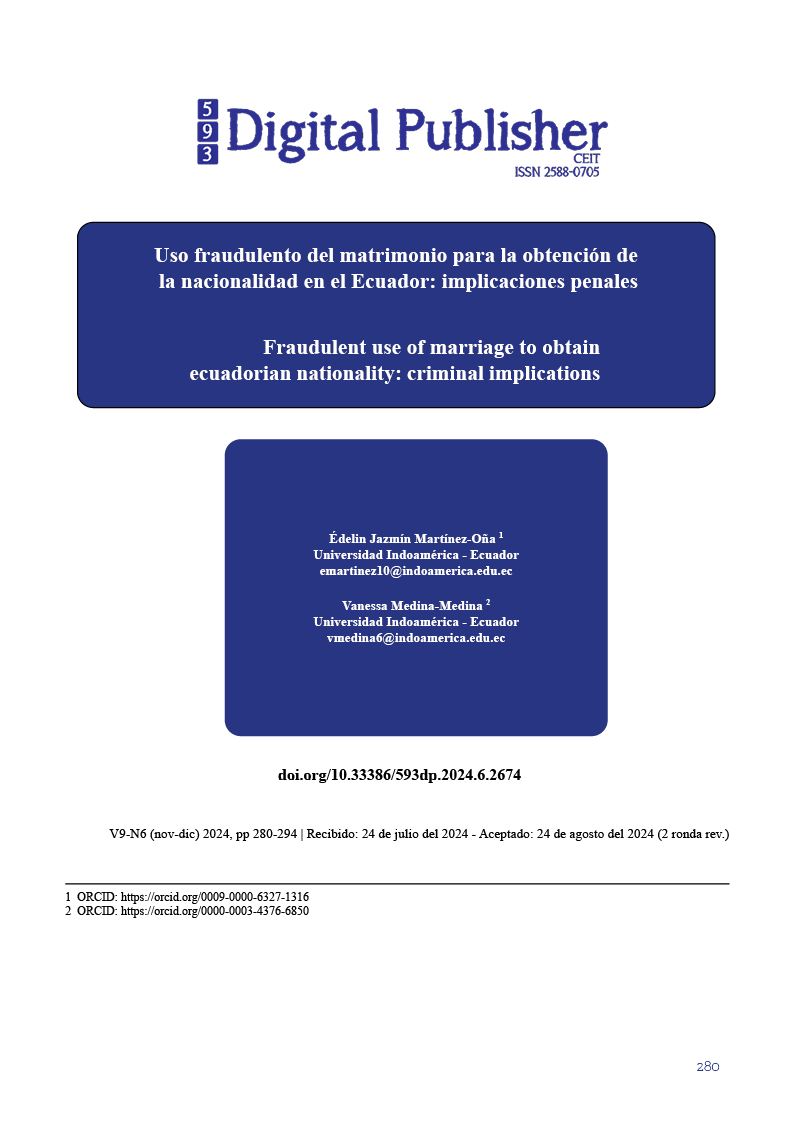Fraudulent use of marriage to obtain ecuadorian nationality: criminal implications
Main Article Content
Abstract
This study uses a qualitative descriptive methodology, in a non-experimental longitudinal design. Through scientific methods such as bibliographic review, exegetical, inductive and historical-logical. All of which allow, with their application, to raise as a general objective, critically argue, the criminal implications and consequences that may arise from the fraudulent formalization of marriages in Ecuador, by not meeting the requirements established for their legal validity. The findings indicate that, although Ecuadorian legislation addresses marriage fraud indirectly, significant challenges remain in the detection and effective punishment of these cases. The urgency of developing more specific legislation and clear guidelines to manage these incidents is emphasized, seeking a balance between the protection of individual rights and the integrity of the legal and immigration systems. The result of this analysis highlights the importance of deeply understanding the consequences and legal effects of legal fraud in the marital context, in order to prevent abuses and save human rights.
Downloads
Article Details

This work is licensed under a Creative Commons Attribution-NonCommercial-ShareAlike 4.0 International License.
1. Derechos de autor
Las obras que se publican en 593 Digital Publisher CEIT están sujetas a los siguientes términos:
1.1. 593 Digital Publisher CEIT, conserva los derechos patrimoniales (copyright) de las obras publicadas, favorece y permite la reutilización de las mismas bajo la licencia Licencia Creative Commons 4.0 de Reconocimiento-NoComercial-CompartirIgual 4.0, por lo cual se pueden copiar, usar, difundir, transmitir y exponer públicamente, siempre que:
1.1.a. Se cite la autoría y fuente original de su publicación (revista, editorial, URL).
1.1.b. No se usen para fines comerciales u onerosos.
1.1.c. Se mencione la existencia y especificaciones de esta licencia de uso.
References
Almagro, C. (2020). Fraude de ley y derecho tributario sancionador. Revista de Derecho, Empresa y Sociedad (REDS), 16, 211-228. Recuperado de https://dialnet.unirioja.es/servlet/articulo?codigo=7631169
Asamblea Constituyente del Ecuador. (2005). Código Civil - CC (Registro Oficial S. 46, 24 junio 2005). Ediciones Legales EDLE S.A. Recuperado de https://www.fielweb.com/Index.aspx?rn=75751&nid=31#norma/31
Asamblea Constituyente del Ecuador. (2008). Constitución de la República del Ecuador - CRE (Registro Oficial 449, 20 octubre 2008). Ediciones Legales EDLE S.A. Recuperado de https://www.fielweb.com/Index.aspx?rn=75751&nid=1#norma/1
Asamblea Constituyente del Ecuador. (2014). Código Orgánico Integral Penal - COIP (Registro Oficial S. 180, 10 febrero 2014). Ediciones Legales EDLE S.A. Recuperado de https://www.fielweb.com/Index.aspx?rn=75751&nid=1070225#norma/1070225
Asamblea Constituyente del Ecuador. (2015). Código Orgánico General de Procesos - COGEP (Registro Oficial S. 506, 22 mayo 2015). Ediciones Legales EDLE S.A. Recuperado de https://www.fielweb.com/Index.aspx?rn=75751&nid=1077085#norma/1077085
Asamblea Constituyente del Ecuador. (2017). Código Orgánico Administrativo - COA (Registro Oficial 2do. S. 31, 7 julio 2017). Ediciones Legales EDLE S.A. Recuperado de https://www.fielweb.com/Index.aspx?rn=75751&nid=1095677#norma/1095677
Asto, R. S., & Marron, A. A. (2022). La simulación matrimonial como causal de impedimento matrimonial relativo. Recuperado de https://repositorio.ucv.edu.pe/handle/20.500.12692/115805
Atienza, M., & Ruiz, J. (2023). Ilícitos atípicos: Sobre el abuso del derecho, el fraude de ley y la desviación de poder. Trotta. Recuperado de https://books.google.es/books?hl=es&lr=&id=uI3YEAAAQBAJ&oi=fnd&pg=PT5&dq=fraude+derecho&ots=NlZ2y9wc1G&sig=lHUQKx95o5kjJvxfFNNANlci9EQ
Bernal, D. R., & Díaz, D. S. (2021). Perspectiva del fraude a subvención en el derecho colombiano: Un análisis desde la función pública. Derecho y Realidad, 19(38), 95-112. Recuperado de https://revistas.uptc.edu.co/index.php/derecho_realidad/article/view/13693
Corte Constitucional del Ecuador. (2020). Sentencia No. 335-13-JP/20. Recuperado de https://esacc.corteconstitucional.gob.ec/storage/api/v1/10_DWL_FL/e2NhcnBldGE6J3RyYW1pdGUnLCB1dWlkOic5MmY0NzUxYy03MDE5LTRlMDgtYTcwMC02OGE1YmNkY2QwMDQucGRmJ30=
González, L. M., & Romero, J. G. (2022). La aplicación de la prueba indiciaria en los procesos de simulación del matrimonio civil: Una mirada crítica a la jurisprudencia sobre la materia. Recuperado de https://bibliotecadigital.udea.edu.co/handle/10495/28280
Ministerio de Relaciones Exteriores y Movilidad Humana (2022). Instructivo para declarar la lesividad de actos administrativos que conceden la carta de naturalización a una persona extranjera por matrimonio o unión de hecho con persona ecuatoriana. (Registro Oficial 95, 30 junio 2022). Ediciones Legales EDLE S.A. Recuperado de https://www.fielweb.com/Index.aspx?rn=75751&nid=1173128#norma/1173128
Macías, E. D., Guarnizo, J. Y., & Eloíza, M. (2021). Análisis del régimen de bienes en el matrimonio y la unión de hecho en Ecuador. Sociedad & Tecnología, 4(S2), 449-463. Recuperado de http://institutojubones.edu.ec/ojs/index.php/societec/article/view/163
Mayer, L., & Oliver, G. (2020). El delito de fraude informático: Concepto y delimitación. Revista chilena de derecho y tecnología, 9(1), 151-184. Recuperado de https://www.scielo.cl/scielo.php?pid=S0719-25842020000100151&script=sci_arttext
Morant, V. (2019). Nuevas teorías de la intencionalidad; su aplicación a la simulación matrimonial. Revista General de Derecho Canónico y Derecho Eclesiástico del Estado, 51, 6. Recuperado de https://dialnet.unirioja.es/servlet/articulo?codigo=7186120
Ortiz, J. (2022). Connotaciones psicológicas de la simulación en el matrimonio canónico. Recuperado de https://www.torrossa.com/gs/resourceProxy?an=5293468&publisher=FZ1825
Peñafiel, A. J., Bajaña, L. J., Cárdenas, V. M., & Del Pozo, P. E. (2020). El matrimonio complementario en el Ecuador. Una extensión de derechos, partiendo del reconocimiento del matrimonio igualitario. Universidad y Sociedad, 12(S (1)), 77-86. Recuperado de https://rus.ucf.edu.cu/index.php/rus/article/view/1754
Puchaicela, C. G., & Torres, M. X. (2019). Evolución normativa de la familia en el Ecuador frente a los Derechos Humanos. Revista ESPACIOS, 41(25), 2. Recuperado de http://es.revistaespacios.com/a20v41n25/a20v41n25p02.pdf
Reglamento a la Ley Orgánica de Movilidad Humana. (2022). (Registro Oficial 3er. S. 18, 10 marzo 2022). Ediciones Legales EDLE S.A. Recuperado de https://www.fielweb.com/Index.aspx?rn=75751&nid=1170550#norma/1170550
Yánez, N. S. C., Solano, V., Álvarez, L., & Guerrero, M. E. C. (2021). La familia en Ecuador: Un enfoque desde lo jurídico. Revista Arbitrada Interdisciplinaria Koinonía, 6(11), 129-146. Recuperado de https://dialnet.unirioja.es/servlet/articulo?codigo=7941184


